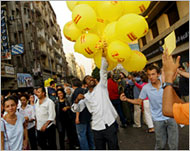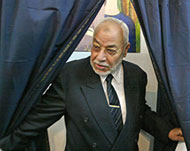Egypt awaits November vote
Egypt’s first multi-candidate elections were hailed as historic, but observers say the defining moment for the nation’s democracy could be the parliamentary elections in November.

Although President Hosni Mubarak won the 7 September election with 88.5% of the vote, for many the result was a foregone conclusion, and the focus has shifted to the meaning of the results and the new political dynamics they created.
“I think question now should be, ‘What after Mubarak?’ not ‘What after the elections?'” Hassan Nafaa, a prominent political science professor at Cairo University, told Aljazeera.net. “We already knew the results beforehand: Mubarak was the inevitable winner.”
Mubarak, who has been in office 24 years, is entering his fifth term.
Political openings
The legislative elections will be a “rare opportunity” for the opposition parties because the political climate in Egypt is ready for this, Nafaa says.
“The political street is mobilised and the government is weak. Add to that the international attention Egypt is getting recently. It’s not every day that you have an opportunity like that.”
 |
|
Al-Ghad leader Ayman Nour |
Clinching second position in the presidential election with 7.9% of the votes, Al-Ghad (Tomorrow) party leader Ayman Nour, 41, emerged a winner by gaining recognition.
He contested the fairness and transparency of the votes, charging that Mubarak’s ruling National Democratic Party (NDP) manipulated the election process.
A network of human-rights groups that monitored the vote issued a series of reports that largely supported Nour’s claims. But the surprise was Nour’s victory over his rival, liberal Al-Wafd Party leader Noaman Gomaa, 71, who scored only 2.7% of the votes.
Al-Ghad factor
“I didn’t see it coming,” said Hussein Abdel-Razek, secretary-general of the left-wing opposition Tagammu party, which boycotted the elections.
Al-Ghad was formed less than a year ago, but Al-Wafd party dates to 1919.
“It seems that the government campaigned against Gomaa because it didn’t want a big political party with a long political history such as Al-Wafd to succeed,” Abdel-Razek said.
 |
|
Gamal Mubarak, the president’s |
“Al-Wafd’s success would ultimately boost its presence in the street [in advance of the parliamentary elections]. Making sure Al-Wafd didn’t win was as important as securing Mubarak’s victory.”
Although most observers and non-governmental groups monitoring the election questioned the accuracy of the results and the legality of the voting process, the official figures represent a barometer of the state of Egyptian politics.
Voter turnout was 23% of Egypt’s 32 million registered voters, which means that 7.3 million cast ballots, six million voting for Mubarak. Egypt’s population is 72 million.
Weak victory
“Mubarak won with only 19% of the votes,” said Abdel-Razek, “and although I’m convinced the real number is much less than that, this is a weak victory.”
Nour, on the other hand, received only half a million votes.
According to Amr El-Choubaki, an expert at the Al-Ahram Centre for Political and Strategic Studies, the six million who voted for Mubarak reflect “how the state operates”.
 |
|
The Kifaya (Enough) movement |
Giant campaign posters and billboards carrying Mubarak’s pictures still decorate highways, squares and Cairo’s many flyovers. New posters congratulating him on his victory have sprung up.
Despite the modern look of Mubarak’s campaign, which included sleek TV ads and impressive video clips encouraging people to vote, “the state resorted to the same old tools of busing masses of government employees to vote for Mubarak”, El-Choubaki said.
“Egypt’s public sector loosely consists of six million employees, and a massive number of this sector was transported to polling stations. It has always been like that.”
Choubaki, echoing widespread speculation, says that the Muslim Brotherhood’s members and supporters voted for the Al-Ghad leader.
Strange bedfellows?
On the surface, the liberal Al-Ghad and the radical Brotherhood make strange bedfellows, but Choubaki argues that voting for Nour was an act of protest against Mubarak and Gomaa.
 |
|
Students hold posters of the |
“By succeeding in emphasising the role of the victim when the authorities arrested him earlier this year, Nour epitomised dissent par excellence and that’s why the younger cadres of the Brotherhood and younger age groups in general voted for him,” Choubaki said.
Nour’s political future depends on his ability to move beyond this image to that of a person capable of implementing change, Choubaki said.
The Al-Ghad leader is not oblivious to this challenge. His words “my next battle will be with Gamal Mubarak” made the headline of the independent daily Al-Masri Al-Yom newspaper last Sunday.
Many think Mubarak’s 42-year-old son Gamal, who leads the NDP’s influential Policies Committee, is being groomed to succeed his father. His speedy rise within the NDP’s ranks and the rumoured succession helped trigger the anti-Mubarak groups generally referred to as the Kifaya (Enough) movement.
Future challenger
“If the authorities do not try to put and end to Ayman Nour’s political career and his party the same way they froze and practically finished the Labour party five years ago, future competition could very well be between Nour and Gamal,” said Ayman El-Sayyad, managing editor of the prestigious monthly Weghat Nazar magazine.
 |
|
Brotherhood’s Mahdi Akef leads |
But the decisive factor, El-Sayyad said, are the two months before the parliamentary elections in November.
The legislative elections are crucial, argues El-Sayyad, because only political parties that secure 5% of the parliament’s 444 seats will be permitted to field candidates for the 2011 presidential elections.
While the Muslim Brotherhood remains the biggest opposition force in Egypt and the NDP’s serious competitor, it is illegal and excluded from the presidential competition.
This leaves the NDP and any party that can get the required number of seats.
“In that sense,” said El-Sayyad, “the parliamentary elections will determine who will be running for president in 2011 and thus determine the shape of Egypt’s political future.”